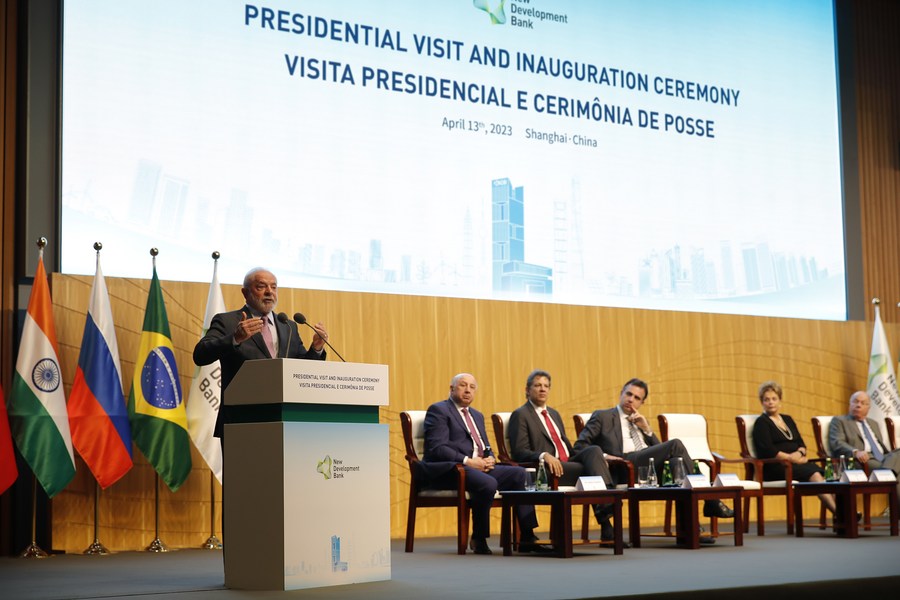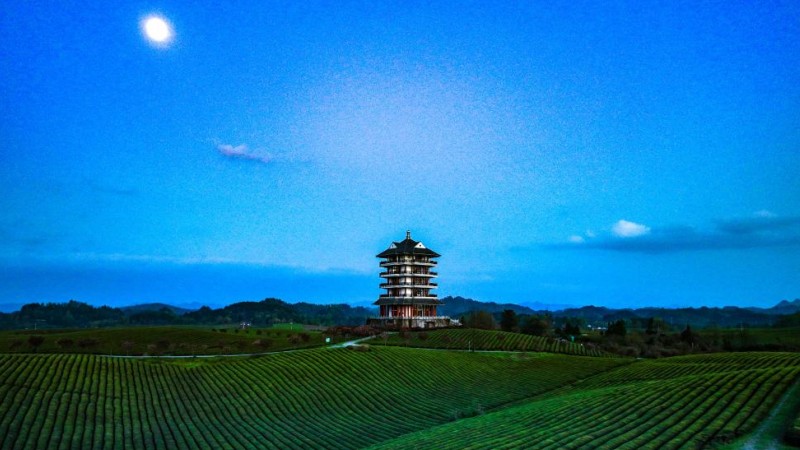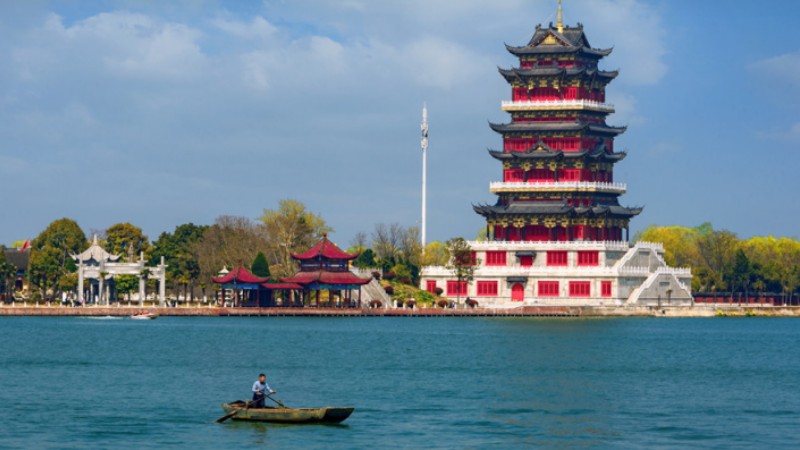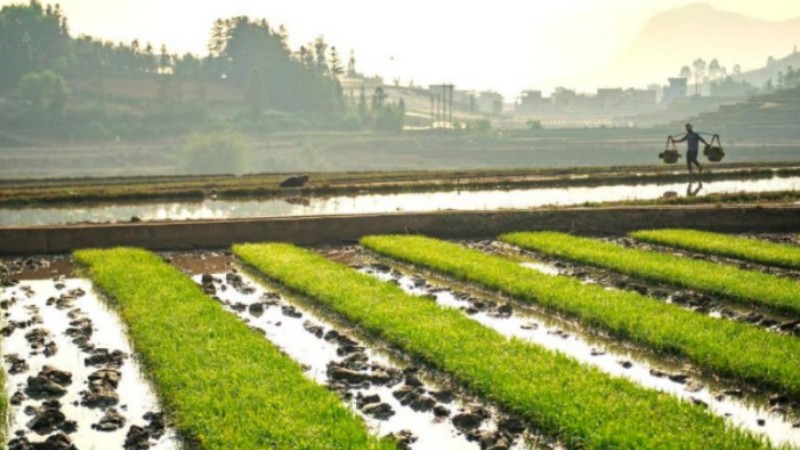Xiplomacy: China and Brazil -- friends oceans away

Brazilian President Luiz Inacio Lula da Silva and his wife receive flowers presented by children from the Shanghai Children's Palace of the China Welfare Institute and pose for a photo with them upon arrival in Shanghai, east China, April 12, 2023.
Ever since China and Brazil established diplomatic ties 49 years ago, the two countries have maintained close high-level exchanges and solid political mutual trust.
BEIJING, April 16 (Xinhua) -- "I've gotten a job, bought a sofa and a refrigerator with the money I earned, plastered the exteriors of my house with cement, have access to the Internet at home, and learned how to make business contacts, purchase and market online. All my dreams have come true," Marlene Araujo Dias told Xinhua.
Living in a forested village in the northern Brazilian state of Tocantins named Malhadinha, Araujo Dias is one of the many locals feeling their lives have changed since the launch of a Chinese-built fruit processing plant in August 2021. The change, which Araujo Dias described as "turning plain water into red wine," epitomizes close cooperation between the two countries oceans away.
The latest state visit of Brazilian President Luiz Inacio Lula da Silva to China, during which he and Chinese President Xi Jinping held talks, has mapped out an even brighter future for bilateral ties, where the two biggest developing countries and emerging markets in the Eastern and Western hemispheres work together to deliver greater benefits to the two peoples, and play a more important and positive role for peace, stability and prosperity in their regions and around the world.
"FRIENDSHIP IS LIKE A BOTTLE OF WINE"
"Friendship is like a bottle of wine, the older, the better." This Brazilian proverb quoted by Xi during his visit to Brazil in 2014 was repeated by Lula on Thursday when he praised the relationship between the two countries as "extraordinary" in China.
Ever since China and Brazil established diplomatic ties 49 years ago, the two countries have maintained close high-level exchanges and solid political mutual trust. In 1993, Brazil became the first developing country to establish a strategic partnership with China, and in 2012 that partnership was upgraded to a comprehensive strategic one. From 2006 to 2022, the China-Brazil High-Level Coordination and Cooperation Committee held six meetings, pushing for continuous fruits in all-round bilateral practical cooperation.
Agricultural products, minerals and petroleum have been pillars in the economic cooperation between China and Brazil. Investment from China in infrastructure and projects for the public good has benefited Brazilians. Moreover, the opening of a new cargo air route linking the southern Chinese metropolis Shenzhen to Sao Paulo, Brazil's largest city, earlier in April is expected to further stimulate e-commerce trade between the two countries.
High-level interactions have become more frequent in recent years, too. In July 2014, Xi went to Brazil to attend the sixth BRICS summit, and met with leaders from the Community of Latin American and Caribbean States. In November 2019, he travelled to Brazil again to attend the 11th BRICS summit. Lula, an old friend of the Chinese people who has visited China multiple times, chose China as his first destination outside the Americas after taking over the Brazilian presidency early this year.

Brazilian President Luiz Inacio Lula da Silva visits an exhibition hall on the latest development in digital technology and digital economy at the Shanghai Research Center of Huawei in Shanghai, east China, April 13, 2023. (Xinhua/Gao Feng)
Stressing that China always sees its relationship with Brazil as a high priority on its diplomatic agenda, Xi said Friday that "China welcomes more high-quality products from Brazil into its market. China will actively explore greater synergy between its Belt and Road Initiative and Brazil's reindustrialization strategy."
The two countries have also jointly played an important role in today's turbulent world, communicating and coordinating closely within such multilateral frameworks as the United Nations, the World Trade Organization, BRICS and the Group of 20.
Facing global changes of a magnitude unseen in a century, China and Brazil are resolved to practice true multilateralism, advocate the common values of humanity, work for a more just and equitable international governance system, truly safeguard the common interests of developing countries and international justice and equity, and build a community with a shared future for mankind, Xi said Friday.
Lula said Brazil stands ready to work with China to contribute to developing countries' efforts to shake off unfair rules and realize a fairer and more balanced development.
"NEW RECORD IN TRADE"
Moored at the Port of Acu in the city of Rio de Janeiro, Chinese supertanker YUAN PENG YANG quietly awaits its departure for Asia once it is fully loaded with containers of Brazilian crude oil.
Vinicius Patel, director of the Port Administration, told Xinhua that exporting crude oil and iron ore to China has been one of the core businesses of the port since its operation in 2014.
"We signed new contracts with Chinese companies last year. Our exports to China have hit a new record," Patel said.
The buzz of the port is a stellar example of the booming trade between China and Brazil. "When I first visited Beijing, few analysts imagined that the Sino-Brazilian partnership would acquire the relevance it has today. Since then, our trade has multiplied 16-fold and China has become Brazil's main trading partner," Lula said in a written interview with Xinhua shortly before departing for his state visit to China.
"The value of our exports to China is greater than the sum of our exports to the United States and the European Union," he said, "China is a great engine for the Brazilian agro-industry."
China has been Brazil's biggest trade partner for 14 consecutive years, and Brazil is the first Latin American country to hit a trading volume of over 100 billion U.S. dollars with China.

A container ship docks at Rio de Janeiro Port in Brazil, March 20, 2023. (Photo by Claudia Martini/Xinhua)
In 2022, two-way trade stood at 171.35 billion dollars. China imported 54.4 million tons of soybeans and 1.11 million tons of frozen beef from Brazil, taking up 59.72 percent and 41 percent of their total import amount, respectively, showed data from China's General Administration of Customs.
On Feb. 7, the People's Bank of China signed a memorandum of cooperation with the Central Bank of Brazil to establish RMB clearing arrangements in Brazil, a move experts say will improve bilateral trade efficiency and defuse external risks to provide an effective safeguard mechanism for trade between the two countries.
After the talks between Xi and Lula on Friday, the two presidents witnessed the signing of various bilateral cooperation documents on trade and investment, digital economy, scientific and technological innovation, information and communications, poverty reduction, quarantine, space and others.
Gustavo Biscassi, head of External Affairs of Brazil's mining giant Vale, told Xinhua that for his company, which has been exporting products to China for the last 50 years, "China is not only our largest market, but also a critical supplier for the mining, infrastructure and logistics equipment and services."
"We are looking forward to continuing our close cooperation with China in the next 50 years," he said.
"WHEN CULTURES COME TOGETHER"
On Jan. 19, red lanterns, Chinese paper-cuts and lion dances decorated the ancient Brazilian city of Recife. Hundreds of Brazilians gathered at the city's Marco Zero Square on this very day, not only to mark the arrival of the Year of the Rabbit, but also to celebrate the inclusion of the Chinese New Year into Recife's official calendar.
"Our historical heritage, with the reception of the light show of China, is as if the two cultures are united ... and talk a little to the world that brotherhood between peoples is possible. And that, how beautiful it is when cultures come together!" said City Councilor Cida Pedrosa.
"The relationship between peoples is extremely important, because what makes a culture flow and (stay) alive is when one culture meets another culture," she said.

Brazilian President Luiz Inacio Lula da Silva speaks at the inauguration ceremony of the new president of the New Development Bank (NDB), Dilma Rousseff, former Brazilian President, at the bank's headquarters in Pudong, Shanghai, east China, April 13, 2023. (Xinhua/Gao Feng)
On Sept. 19, 2022, Recife okayed a decree proposed by Pedrosa to establish the Chinese New Year as an official holiday in the city. In early February this year, the city of Foz do Iguacu in southern Brazil also decided to make the Chinese New Year celebration an annual event.
Cultural and people-to-people exchanges between the two countries have been flourishing over the years, for example, in sports, medicine and the arts. Fourteen Confucius Institutes have been established in Brazil, the most among Latin American countries, and Brazil has set up a national festival to celebrate every August the arrival of Chinese immigrants to Brazil.
In February 2021, the first Chinese school in Brazil opened in Rio de Janeiro. Two years later, the two countries launched virtual courses for teaching Chinese language and culture to beginners.
China and Brazil need to capitalize on the 50th anniversary of their diplomatic relations next year to carry out more people-to-people exchanges, and cultivate stronger public support for Sino-Brazilian friendship, Xi said Friday.
Similarly, Lula said he has full confidence that Brazil-China relations will embrace a brighter future.
Photos
Related Stories
Copyright © 2023 People's Daily Online. All Rights Reserved.









